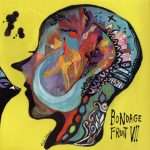Bubu – Anabelas (1978/2004)

Artist: Bubu
Album: Anabelas
Genre: Eclectic Prog
Label: Serie Collectors
Year Of Release: 1978/2004
Quality: FLAC (image+.cue)
Tracklist:
1. El Cortejo de un Día Amarillo (19:25) :
– a) Danza de las Atlántides
– b) Locomotora Blues
2. El Viaje de Anabelas (11:12)
3. Sueños de Maniquí (9:16)
Personnel:
– Petty Guelache / lead & backing vocals
– Eduardo Rogatti / guitar, Fx
– Sergio Polizzi / violin
– Cecilia Tenconi / flute, piccolo, bass flute
– Wim Forstman / tenor saxophone, lyrics
– Edgardo “Fleke” Folino / bass, Fx
– Eduardo “Polo” Corbella / drums, percussion
– Daniel Andreoli / composer & arranger
With:
– Mario Kirlis / piano
– Cecilia X Z / chorus vocals
– Golo / chorus vocals
– Manzana / chorus vocals
– Maqui / chorus vocals
– Marcelius “el potente” / chorus vocals
– Voulét / chorus vocals
Bubu was one of the most amazing bands to come out of the Latin American rock scenario, their own one shot ‘Anabelas’ being an awesome piece of avantgarde prog music. Not only is the instrumentation odd, but the compositions and subsequent arrangements are pretty complicated (not gratuitously complicated, let’s state this clear). The combined mastery of all musicians involved allow Bubu to shine immensly as an exquisite yet fiery ensemble, full of both weirdness and distinction. Even when some guitar and sax sounds feel a bit harsh, the listener can feel that the sense of exquisiteness prevails. The sax, flute and violin players wander with ease and precision from free-jazz to dissonant contemporary chamber to well defined instrumental “chorales” all along the way; in parallel, the guitar/bass/drums trio make a powerful statement in the crossroads of 73-74 King Crimson and 71-73 Mahavishnu, as well as some Canterbury elements (on its wildest side). Many guitar solos and textures happen to mingle fluidly among the wind and violin passages, which allows the melodic thing become so weird and at the same time, so captivating. The opening track is the sidelong suite that makes, IMHO, the most impressive number in the whole record. The band shows their skills at creating intense complexity without losing consistence, as well as at developing motif expansions cleverly and interact as a solid unit. A particular mention goes to bassist Folino, who manages to make his instrument featured among the storms created by most of his fellows. This track also includes quotations from Elgar’s ‘Pomp and Circumstance’ during one of its eerier sections. Another special mention goes to the deceitfullly relaxing motif based on acoustic guitar and dreamy chorale: the explosive sax solo brings an anticipation of a tension soon to resurface and deliver the track’s closing climax. A masterpiece in itself is ‘El Cortejo de un Día Amarillo’. All in all, the other two pieces are nothing to be dismissed; while not being as epically diverse as the aforesaid suite, they complete the album’s musical direction with total cohesiveness. Particularly, I find a big deal of 71-75 Zappa-esque niches on ‘El Viaje de Anabelas’, which turns out to be the most exhalarating of all three pieces. It starts by bringing some bucolic episodes before the band goes headlong for a series of dissonant articulations that eventually lead to a playful section. A violin solo creates an aura of solemnity that gradually builds up to a majestic, moderately explosive ending. ‘Sueños de Maniquí’ kicks off with a dreamy sung prologue based on piano scales, but soon a guitar sustained lead prepares the road for the full band entry, endulging in an exciting jazz-rock excursion. The return of the sung section now benefits from the use of instrumental colors, which mostly serve as means for orchestral layers and counterpoints. The 11/4 closing theme remainds of some other in ‘El Cortejo’, only with a slighltly weirder edge. While being far from your “prototypical” melodic Latin American symph prog, ‘Anabelas’ remains one of the top Argentinian prog works ever – it sure deserves the perfect rating.
Review by Cesar Inca



